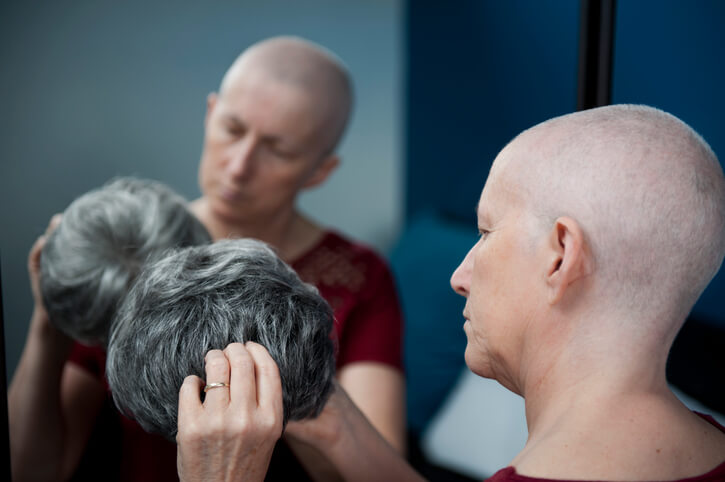Chemotherapy destroys rapidly dividing cells to prevent cancer from spreading (also known as “metastasizing”). But since your body’s normal cells also rapidly divide, they get just as damaged by chemotherapy drugs as cancerous ones. Luckily, your body’s healthy, normal cells will eventually recover from those temporary chemo side effects. As your energy levels rise, things like skin, nails and hair typically return back to normal functioning after finishing chemotherapy. For the most part, life resumes, though some breast cancer chemo side effects can be lasting — and possibly even permanent.
Temporary Chemo Side Effects Commonly Reported By Breast Cancer Patients
Chemo side effects vary for each patient, and there’s no way of knowing which complications you may personally experience. Two patients diagnosed with stage 3 breast cancer who follow identical treatment regimens likely won’t experience the exact same symptoms. Your chemo side effects vary by age, drug regimen, how aggressive your cancer is, current health status and other factors. Fortunately, certain medicines can help relieve some chemo side effects, including nausea, which famously affects many breast cancer patients. Always report any chemo side effects to your oncologist during your active treatment, especially if they’re unexpected or severe.
Here are the most commonly reported short-term chemo side effects during active treatment for breast cancer:
- Diarrhea
- Fatigue
- Anemia (low blood cell count)
- Fertility issues
- Hair loss/changes
- Memory loss
- Infection
- Mouth as well as throat stores
- Nail changes/brittle nails
- Nausea
- Neuropathy (tingling or loss of feeling in hands as well as feet)
- Vomiting
- Vaginal dryness
- Weight loss/gain
Possible Long-Term Breast Cancer Chemo Side Effects
A long-term side effect usually begins during active chemotherapy and persists after you’ve completed treatment. A late chemo side effect can begin months or even years after finishing chemotherapy. (Unfortunately, almost any chemotherapy drug can cause long-term or late side effects.)
Some notable late or long-term breast cancer chemo side effects include:
- Cataracts
- Early menopause
- Infertility
- Heart problems
- Liver problems
- Lung disease
- Nerve damage
- Osteoporosis
- Permanent alopecia (hair loss)
You cannot prevent most late or long-term chemo side effects. There’s also no way to tell whether you’ll experience any. Your survivor care includes discussing these possibilities with your oncologist both before and after chemotherapy treatment.
The Mayo Clinic website states, “Different chemotherapy drugs cause different late effects. So if you didn’t take the chemotherapy drugs that can cause infertility, then you aren’t believed to be at risk of that particular late effect.”
It isn’t clear why some patients experience certain long-term effects while others do not. Among all possible long-term chemo side effects, however, permanent hair loss is perhaps the most easily avoidable outcome. It’s exclusively attributed to taking a taxane drug called Taxotere, affecting up to 15% of cancer patients after finishing treatment. For most patients, regular cell growth commences around 30 days after completing chemotherapy. In fact, you should see scalp and body hair growing an inch or more at the two-month mark. But if you take a chemo cocktail that contains Taxotere (known generically as docetaxel), your hair might never grow back.
Which Chemo Drugs Treat Breast Cancer?
Chemotherapy that combines different drugs into a single infusion effectively treats more aggressive breast cancers. The most common breast cancer chemo drugs include:
- Anthracyclines such as Adriamycin (doxorubicin) and Ellence® (epirubicin)
- Taxanes, such as Taxol (paclitaxel) and Taxotere
- 5-Fluorouracil (5-FU)
- Cytoxan® (cyclophosphamide)
- Paraplatin® (carboplatin)
Oncologists frequently treat advanced breast cancers by combining Taxol or Taxotere in a cocktail along with other chemo drugs. Taxol or Taxotere + Cytoxan is one of the most common chemo drug cocktails given to breast cancer patients today. Many consider it chemo’s “gold standard” treatment. That’s because combining Taxol or Taxotere’s cytotoxic properties with the alkylating agent Cytoxan is proven to give better survival outcomes.
Oncologists often give Taxol or Taxotere alongside AC, or Adriamycin, in combined chemotherapy infusions. Oncologists most often prescribe this to treat node-positive cancer or a breast cancer recurrence.
Chemo Side Effects: Comparing Taxotere vs. Taxol
Since Taxotere may cause permanent alopecia (persistent significant hair loss), many cancer survivors face their painful memories every day. Fortunately, studies show Taxol is equally effective for treating breast cancer, and unlike Taxotere, it doesn’t cause permanent hair loss.
A study comparing both taxane drugs found patients given Taxol weekly for 12 weeks lived longer without breast cancer recurrence cancer than those given four treatments every three weeks. The study also found Taxol more effective than Taxotere for treating breast cancer. The Washington Post released the following statement about the study: “Women with breast cancer who receive drugs known as taxanes after standard chemotherapy have a substantially reduced risk of recurrence and of death. The other taxane, Taxotere (docetaxel) is more potent than Taxol.”
What You Can Do
If your oncologist recommends a chemotherapy regimen containing Taxotere, ask about permanent hair loss risks and potentially switching to Taxol. And if you or a loved one suffered permanent hair loss after taking Taxotere, you may be entitled to compensation. Since Sanofi sold Taxotere for 10 years before disclosing permanent hair loss among possible chemo side effects, lawsuits are underway. To see if you may qualify for a cash settlement, fill out your free Taxotere claim evaluation form today. Afterwards, an experienced attorney who understands how to get the justice you deserve will call you to discuss your case.
Related: Taxotere vs. Taxol: Which Chemo Drug Is Right For You?
Mandy Voisin
Mandy Voisin is a freelance writer, blogger, and author of Girls of the Ocean and Star of Deliverance. As an accomplished content marketing consultant, mom of four and doctor's wife, Mandy has written hundreds of articles about dangerous drugs and medical devices, medical issues that impact disabled Americans, veterans' healthcare and workers' compensation issues since 2016.

